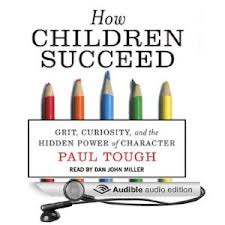How Children Succeed
 Last night I began reading How Children Succeed: Grit, Curiosity, and the Hidden Power of Character by Paul Tough. I am only about halfway through it but I am finding it incredibly interesting.
Last night I began reading How Children Succeed: Grit, Curiosity, and the Hidden Power of Character by Paul Tough. I am only about halfway through it but I am finding it incredibly interesting.
The general premise is that children need more than “smarts” to be successful in school and in life. There are a variety of other “skills” or “dispositions” that may be more important to nurture in children than the academic skills that everyone is so busy pushing. These are “perseverance” or “stick-to-it-iveness”, “cognitive flexibility”, “grit”, “endurance”, and other hidden character traits.
The Amazon review says,
How Children Succeed introduces us to a new generation of researchers and educators who, for the first time, are using the tools of science to peel back the mysteries of character. Through their stories—and the stories of the children they are trying to help—Tough traces the links between childhood stress and life success. He uncovers the surprising ways in which parents do—and do not—prepare their children for adulthood. And he provides us with new insights into how to help children growing up in poverty.
Early adversity, scientists have come to understand, can not only affect the conditions of children’s lives, it can alter the physical development of their brains as well. But now educators and doctors around the country are using that knowledge to develop innovative interventions that allow children to overcome the constraints of poverty. And with the help of these new strategies, as Tough’s extraordinary reporting makes clear, children who grow up in the most painful circumstances can go on to achieve amazing things.
This provocative and profoundly hopeful book has the potential to change how we raise our children, how we run our schools, and how we construct our social safety net. It will not only inspire and engage readers, it will also change our understanding of childhood itself.
A lot of the research hits really close to home as many of the examples are from Chicago. He explores Fenger High School, the 100’s of Roseland, Arne Duncan, and CPS. I’ll give you the wrap up once I’m done, but this might be the new “must-read” for all teachers.
Excellent book and perhaps preschool is a good place to develop a certain level of persistence. For that, children need time to work on things that challenge them, and they need support to learn how to cope with frustration. I think this is so important and yet we often don\’t build in enough time in educational settings for learners to persist in things that are difficult for them. Instead, we tend to praise kids who finish first and that kind of thing. I look forward to more discussion about this book. It really does hit close to home.
When I was at the Tinkering Lab Board Meeting last Thursday, we were discussing this very thing. Allowing children to explore, fail, and then readjust, and explore some more is good. How do we encourage children to keep going time after time. I agree that we need to move away from \”finishing\” in the early years (sorry Montessori folks) and allow children to continually work on the same problem over and over, through failure after failure.
I really appreciate that this book also explains ways in which we can teach or work on these skills rather than attributing them to temperament (you either \”have\” these or \”don\’t\”).
Lot\’s more to discuss. I think it should be \”One book, One Chicago\”.